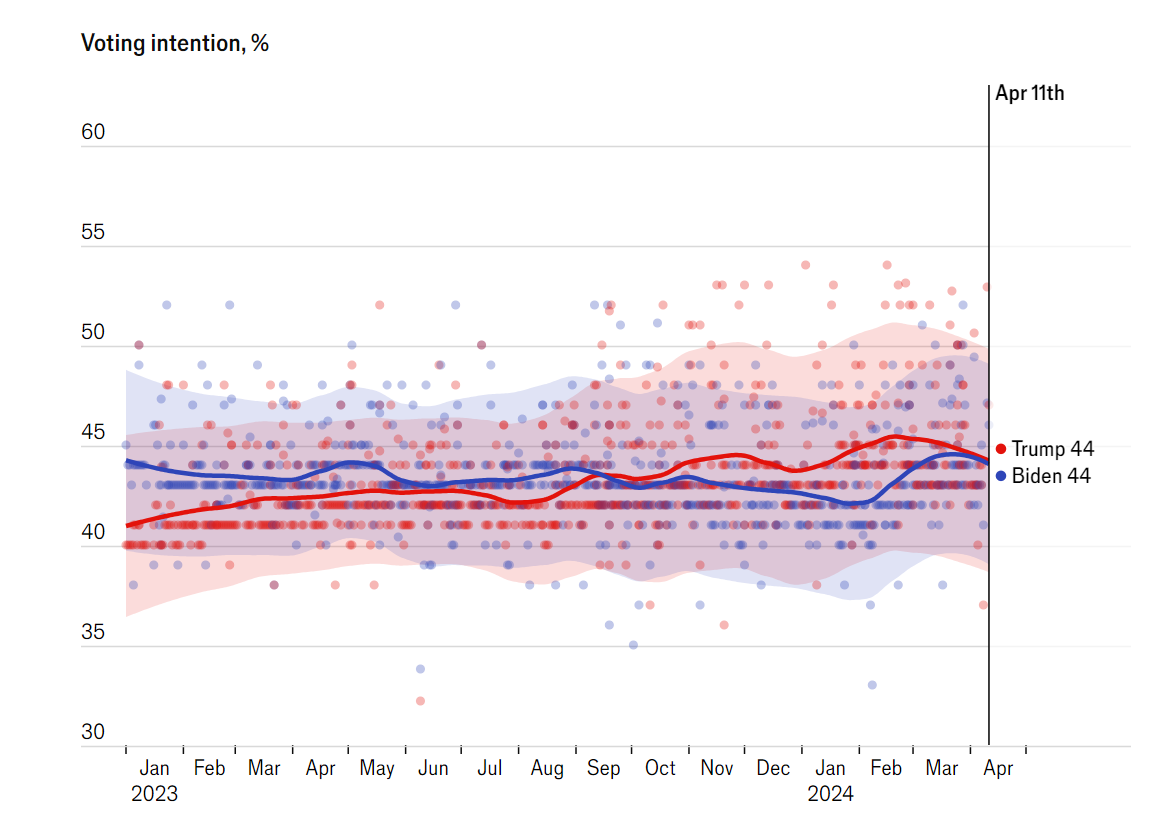In February, State of Play discussed the impacts of elections on the stock market (you can read this here). The broad consensus from the article was that the mainstream media amplify the short-term noise around electoral events while experienced investors embrace their long-term goals, trusting in the overall fundamentals, with data not showing any significant differences to any other non-election year. Although this is true by historic standards, with Donald Trump seemingly back in the running to become the next US president, the uncertainty and unpredictability of a Trump presidency could understandably cause some concerns for investors. What if Donald Trump and the Republican Party win the US election? How would markets react? Santander Asset Management discusses in this week’s State of Play.
Can Trump win?
On 5 November, Americans will elect their next president. The contest will feel familiar: the main two candidates are the same as in 2020. Joe Biden faced no viable competition for the Democratic nomination. His predecessor in office, Donald Trump, easily saw off a crowded field in the Republican primary. The Economist is tracking the contest and their latest poll shows that it is neck and neck.1 Though they note that pre-election polls have limited predictive power for the final result until the end of the summer in an election year.

Source: The Economist, 11 April 2024
The polls indicate that the possibility of a Trump presidency is entirely viable, despite facing 88 felony charges, ranging from falsifying business records to conspiring to defraud the country. Most of his trials are scheduled to begin well before election day in November which could derail his campaign should he be found guilty.2
What could happen if Trump wins?
Americans will elect 471 federal officials in November: 435 members of the House of Representatives, 34 senators, a vice-president and a president. If Trump were to win the election in November, his ability to make changes would depend on whether the Republican Party has control of both the Senate and House of Representatives. The enactment of a law always requires both chambers to separately agree to the same bill in the same form before presenting it to the President.3 Currently, the Democrats control the Senate by just 2 seats out of 100 and the Republicans control the House of Representatives by a margin of 5 out of 435 seats.4 In the Senate, the seats contested this year are in extremely favourable states for Republicans, so the control of the Senate could flip to the Republicans. The House of Representatives is expected to be a close call, with early predictions that the Democrats could take a slight majority.4 If they are both split, it will be hard for the winner of the election to pass the legislation they promised. However, if a party were to gain control of both the Senate and the House of Representatives, they should be able to pass the legislation that was promised as part of their electoral campaign.
What could happen if Trump won the presidency and the Republican Party won majorities in the Senate and House of Representatives? Oxford Economics has used their forecasting model to predict two different scenarios, which they have labelled ‘limited Trump’ and ‘Full-blown Trump’.5
Limited Trump
This scenario assumes a Republican-led Congress extends the personal tax cuts under the 2017 tax law and enacts higher spending levels, while Trump uses his presidential powers to reduce immigration and impose targeted tariffs on China and the EU.
Their model predicts that these policy changes will raise the level of real economic growth by 0.6% higher than their baseline prediction for 2027. However, it also predicts that these changes will slightly increase core inflation (the change in prices of goods and services, except for those from the food and energy sectors) in 2027 and 2028. As core inflation is the Federal Reserve's (Fed) preferred measure of inflation, this poses some risks to interest rate decisions. They predict that the Fed will be slower in bringing interest rates down in 2026 before pausing in 2027.
Full-blown Trump
This scenario assumes Republicans prevent the expiration of the personal tax cuts under the 2017 tax law and cut corporate taxes, and lawmakers agree to even higher spending levels. At the same time, the president curbs immigration to a greater extent and imposes across-the-board tariffs on major trading partners.
Their model predicts that inflation would be even higher, while the renewed trade wars more than offset the benefit from lower taxes, dragging down the level of real economic growth by as much as 1.8% lower relative to their predicted baseline. Their model forecasts that the economy slows to a pace that is well below its potential growth rate. Despite the slowdown, they believe that the Fed focuses on bringing inflation down to its target of 2% and pauses interest rate cuts in 2026 and 2027.
Markets
The main concern in both scenarios forecasted by Oxford Economics is that they both predict an increase in inflation. The Fed has recently raised interest rates to combat ultra-high inflation and bring it in line with their 2% target. The threat of higher interest rates can present challenges for the economy, which may slow business activity and impact share prices. However, the ‘Limited Trump’ scenario sees positive economic growth, meaning that higher inflation and slower interest rate cuts are not predicted to hurt the economy. The ‘Full-blown Trump’ scenario is not likely to be good for markets if Oxford Economics predictions hold true: lower economic growth, high inflation and higher for longer interest rates would not be a good market environment. Both of these scenarios depend on the Republican Party winning majorities in the Senate and House of Representatives. It wouldn’t be bad for markets if the chambers were to be split. Markets have historically performed well in this scenario as it provides a level of certainty that new legislation will be hard to pass. The S&P 500 has historically done quite well under this scenario, up more than 17% on average.6
Conclusion
Of course, this is a hypothetical scenario based on a series of estimates and calculations. World events are ever-changing and there is likely to be many twists and turns before the election. If Trump were to win the election, there is likely to be a lot of short-term noise and volatility, but the premise of the previous State of Play remains - experienced investors embrace their long-term investment goals, trusting in the overall fundamentals.
The value of seeking guidance and advice
It is important to seek advice and guidance from a professional financial adviser who can help to explain how to build an appropriate financial plan to match your time horizons, financial ambitions and risk comfort. If you already have a plan in place or have already invested, it is important to allocate time to review this to ensure this remains on track and appropriate for your needs.

Investing can feel complex and overwhelming, but our educational insights can help you cut through the noise. Learn more about the Principles of Investing here.
Note: Data as at 18 April 2024. 1Economist, 16 April 2024, 2Economist, 18 March 2024, 3Congress, 16 April 2024, 4Economist, 24 March 2024, 5Oxford Economics, 11 April 2024, 6Fortune, 4 November 2020.
Important information
For retail distribution.
This document has been approved and issued by Santander Asset Management UK Limited (SAM UK). This document is for information purposes only and does not constitute an offer or solicitation to buy or sell any securities or other financial instruments, or to provide investment advice or services. Opinions expressed within this document, if any, are current opinions as of the date stated and do not constitute investment or any other advice; the views are subject to change and do not necessarily reflect the views of Santander Asset Management as a whole or any part thereof. While we try and take every care over the information in this document, we cannot accept any responsibility for mistakes and missing information that may be presented.
The value of investments and any income is not guaranteed and can go down as well as up and may be affected by exchange rate fluctuations. This means that an investor may not get back the amount invested. Past performance is not a guide to future performance.
All information is sourced, issued, and approved by Santander Asset Management UK Limited (Company Registration No. SC106669). Registered in Scotland at 287 St Vincent Street, Glasgow G2 5NB, United Kingdom. Authorised and regulated by the FCA. FCA registered number 122491. You can check this on the Financial Services Register by visiting the FCA’s website www.fca.org.uk/register.
Santander and the flame logo are registered trademarks.www.santanderassetmanagement.co.uk





